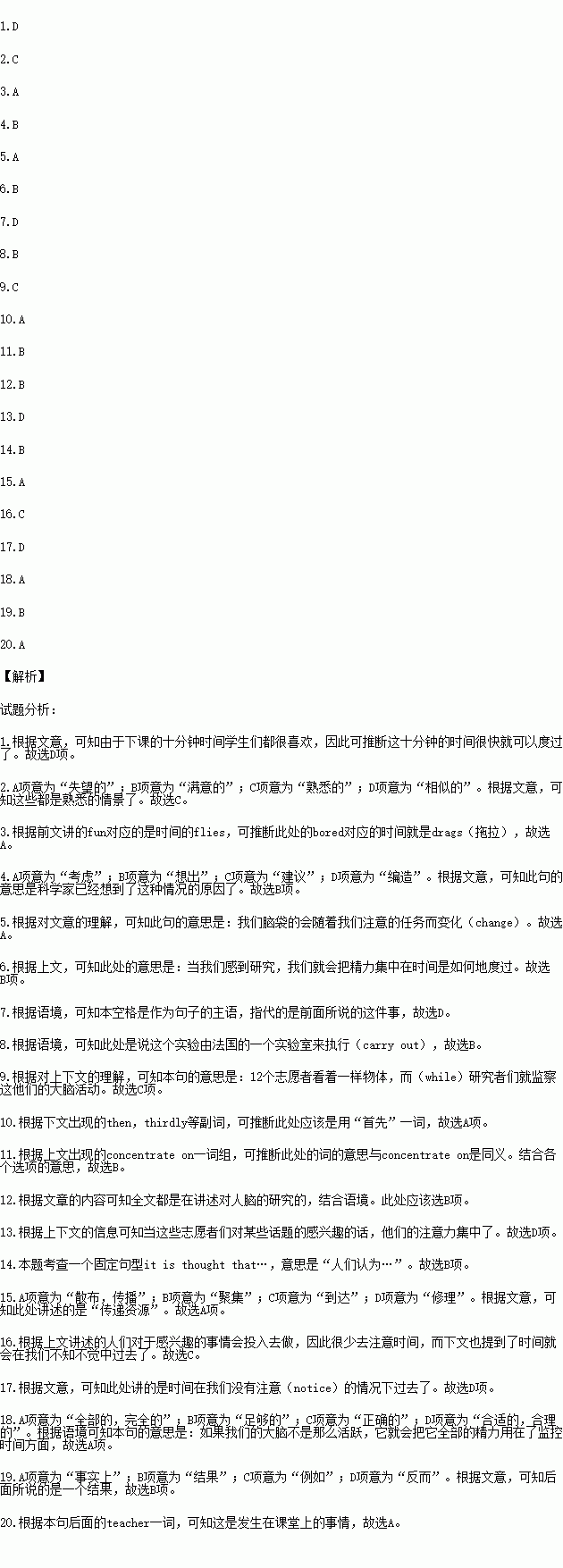题目内容
阅读下列短文,从短文后各题所给的四个选项(A、B、C和D)中,选出可以填入空白处的最佳选项,并在答题卡上将该项涂黑。
You have waited 45 minutes for the valuable 10 minutes’ break between classes.But when the bell for the next class rings, you can’t believe how _______time has passed.
If you are _______ with this scene, you’ll know how time flies when you are having fun and _______ when you are bored.Now scientists have _______ a reason why this is the case.
Scans have shown that patterns of activity in the brain _______ according to how we focus on a task.When we are _______ , we concentrate more on how time is passing.And _______makes our brains think the clock is ticking more slowly.
In an experiment_______ by a French laboratory, 12 volunteers watched an image _______ researchers monitored their brain activity.
The volunteers were told to _______ concentrate on how long an image appeared for, then _______ the color of the image, and thirdly, study both duration and color.The results showed that _______ was more active when the volunteers paid attention to _______ subjects.
It is thought_______ if the brain is focusing on many aspects of a task, it has to _______ its resources, and pays less attention to the clock._______, time passes without us really _______it, and seems to go quickly.If the brain is not so active, it concentrates its _______ energies on monitoring the passing of time._______ , time seems to drag.
Next time you feel bored _______ , perhaps you should pay more attention to what the teacher is saying!
1.A.slowly B.foolishly C.terribly D.quickly
2.A.disappointed B.satisfied C.familiar D.similar
3.A.drags B.stops C.goes D.backs
4.A.thought over B.come up with C.suggested with D.made up
5.A.change B.develop C.grow D.slow
6.A.sleepy B.bored C.excited D.active
7.A.which B.we C.what D.this
8.A.produced B.carried out C.tried D.did
9.A.where B.why C.while D.as
10.A.first B.quickly C.how D.partly
11.A.familiar with B.focus on C.make out D.tell apart
12.A.the researchers B.the experiment C.the clock D.the brain
13.A.no B.less C.more D.some
14.A.when B.which C.that D.where
15.A.spread B.gather C.reach D.fix
16.A.However B.Furthermore C.Therefore D.Finally
17.A.recognizing B.watching C.counting D.noticing
18.A.full B.enough C.right D.proper
19.A.In fact B.As a result C.For example D.Instead
20.A.in class B.with work C.in mind D.of lessons

